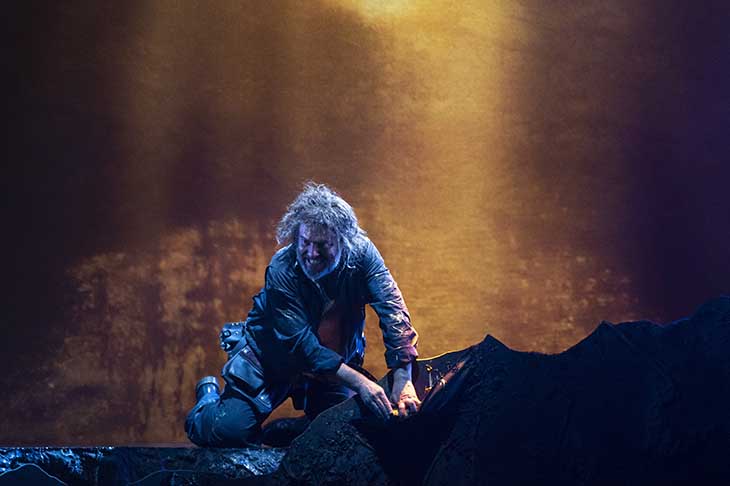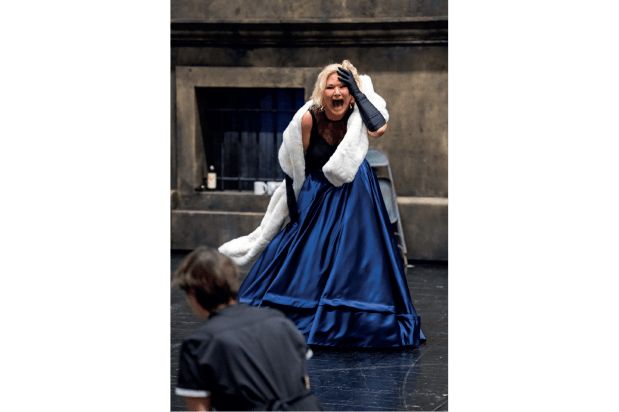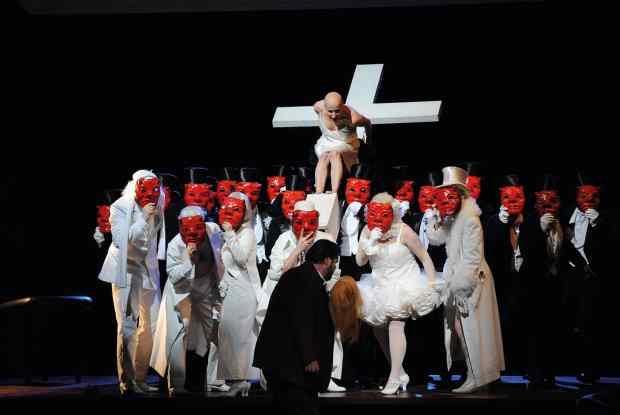At Longborough Festival Opera, Richard Wagner is on the roof. Literally: his statue stands on top of the little pink opera house, surveying the Evenlode valley from beneath a stone beret. He’s not alone, mind. A figure of Mozart looks up indignantly. On the other side of the pediment stands Verdi, arms folded, glowering huffily at the floor. But Wagner is on top: a permanent reminder that this is the company that took on the greatest musical-dramatic challenge in the operatic universe, and in 2013 staged a full production of Der Ring des Nibelungen in a converted barn.
And next week, they’re going to start all over again. The 2019 Festival opens with Das Rheingold, with a full cycle scheduled for 2023, the year that the company’s irrepressible founder Martin Graham turns 80. It’s a brand-new production: LFO isn’t the kind of outfit that can afford to maintain warehouses full of mothballed sets. To create a new Ring from scratch less than a decade after the previous production — when the challenge of mounting a single Ring has been known to break national opera companies — is pretty unprecedented. And since LFO has little left to prove (Michael Tanner called its 2017 production of Tristan und Isolde ‘one of the most exalting experiences I have had in the opera house’), you might be tempted to ask why. To which there’s no more eloquent an answer than attending a performance for yourself. The spirit of the place wells up from Graham’s boyish devotion to Wagner, coupled to his wife Lizzie’s organisational genius. A sense of shared, incredulous delight to be doing this at all pours out of everyone you talk to: tuba players, conductors or the ladies serving the interval tea.
Second time round it’s also a question of how. Surprisingly, direction of the whole massive project has been handed to Amy Lane, a newcomer to Longborough. But Lane worked as associate director on successive revivals of Keith Warner’s Royal Opera Ring, and has been formulating her own plans for nearly a decade.
‘In 2012, when we’d just finished the cycle at Covent Garden, my next job was in Paris working on a musical. I had to get Wagner out of my system, so I spent my spare time designing what I thought my ideal Ring cycle would be, if someone ever asked me. I never thought in a million years that anybody would ask me. Then I got a phone call from Lizzie Graham saying, “Would you like to discuss some Wagner?” And she dropped the Ring cycle on the table. That was quite a moment — as soon as she mentioned what it was, it was a “yes” from me. Then the terror of the undertaking catches up with you — pretty quickly, but in the best way. I mean, what a gift.’
For some directors that terror would only be intensified by the bare-bones practicalities of Longborough’s 500-seat theatre. When you’re working in a former chicken shed — even one with a Bayreuth-sized orchestra pit — you can’t simply install a three-storey spiral of liquid fire, as Warner did at Covent Garden. Lane has embraced Longborough’s animating principle: that practical obstacles spur creativity. ‘The limitations of the stage I found completely appealing,’ she says.
‘Even the train journey from London to Moreton-in-Marsh: you leave the city behind, the air changes and the landscape changes and you suddenly have a horizon. That’s pretty Wagnerian on its own. And then you go into the theatre: there are no wings, you can’t fly anything and I just fell in love with it because it removes any form of trappings. That is why a text-driven, score-driven Ring cycle sits perfectly here — there isn’t much room for trickery. I’m thrilled with our designs: we have a very clean, clear statement space. I believe we’ve found a way of travelling through all of Wagner’s worlds that Longborough won’t have seen before, and which allows the story to live.’
Such innovation doesn’t sit entirely easily with the stereotype of summer opera in the UK — a world of picnics and novelty cummerbunds, where the prospect of artistic change is about as welcome as wasps on a Fortnum’s vol-au-vent. Longborough, built from the ground up over three strenuous decades, has never really been like that. Polly Graham — Martin and Lizzie’s daughter, who’s worked as a staff director at Welsh National Opera and became artistic director of the family firm last year — has described the ‘tropes of country house opera’ as ‘damaging’, and you can see her point. Longborough’s hillside setting is almost inappropriately pretty. The orchestra’s brass section plays gigs in the village pub, and you might spot the general manager scooping up a stray chicken five minutes before curtain-up. (Full disclosure: I made a smallish donation to LFO this year because, like Klingsor’s garden in Parsifal, it’s all just so damnably seductive.)
But the fact remains: if your core business is serving bubbly to the green welly set, you don’t stage a Ring cycle. ‘I really don’t think that’s who we are,’ says Polly. ‘It’s not a grand country house, it’s a new-build in a field, and next to it is an agricultural barn that was converted into a theatre. That’s the extent of any kind of grand estate. All that’s there is an amazing view and the determination to create great work.’ Martin, with his impromtu pre-show speeches, is certainly not your average châtelain. (‘Tell The Spectator that I was a dodgy builder,’ he insists — his first career was as a property developer.) As LFO moves from its early years as upstart overachiever, Polly aims to broaden repertoire and (the real challenge) access; a production of Janacek’s Cunning Little Vixen next season will involve sizeable community participation.
And perhaps, two Ring cycles in, it’s tempting to see LFO’s achievement as something established, rather than a continuous process of taking risks, backing hunches and assuming that no door is locked until it’s been given a vigorous shove. The Grahams’s determination to trust their artists has led to misfires: a grim sci-fi Fidelio, and a 2015 Tristan in which body-stockinged dancers simulated sex during the Act Two love duet.
Other gambles have paid off tenfold. Longborough’s long-serving music director Anthony Negus — who worked with Rudolf Kempe at Bayreuth, and has welded the LFO orchestra into an instrument of formidable passion and power — spent much of his career in staff roles until the Grahams gave him that first Ring. He’s the element of continuity in this new cycle. ‘We are obviously entering a new period of development,’ he says. ‘But it’s important to build upon what we’ve achieved already, and not do what they do so often in Germany, when a whole team moves out of a theatre, leaving nothing behind. This is definitely going to be something new — the most technically ambitious Wagner we’ve ever done.’
Got something to add? Join the discussion and comment below.
Get 10 issues for just $10
Subscribe to The Spectator Australia today for the next 10 magazine issues, plus full online access, for just $10.
You might disagree with half of it, but you’ll enjoy reading all of it. Try your first month for free, then just $2 a week for the remainder of your first year.














Comments
Don't miss out
Join the conversation with other Spectator Australia readers. Subscribe to leave a comment.
SUBSCRIBEAlready a subscriber? Log in